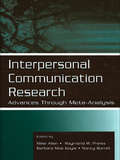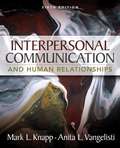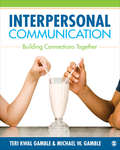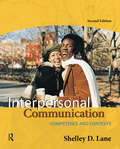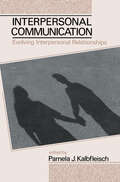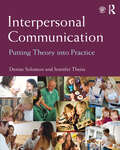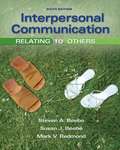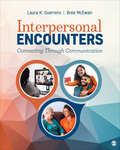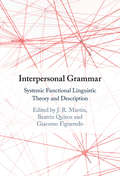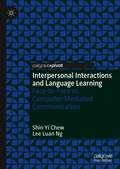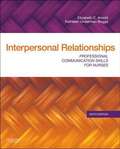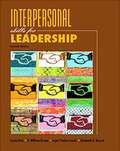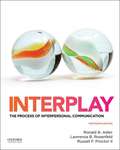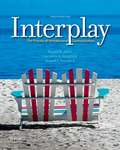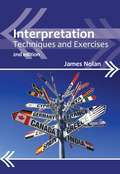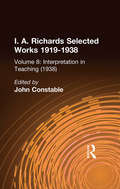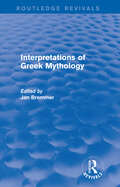- Table View
- List View
Interpersonal Communication Research: Advances Through Meta-analysis (Routledge Communication Series)
by Mike Allen Barbara Mae Gayle Raymond W. Preiss Nancy A. BurrellThis exceptional collection--a compilation of meta-analyses related to issues in interpersonal communication--provides an expansive review of existing interpersonal communication research. Incorporating a wide variety of topics related to interpersonal communication, including couples and safe sex, parent-child communication, argumentativeness, and self-disclosure, the contributions in this volume also examine such basic issues as reciprocity, constructivism, social support in interpersonal communication, as well as gender, conflict, and marital and organizational issues. With contributions organized into five sections, this volume: *sets the stage for independent meta-analyses; *provides an overview of individual characteristics in interpersonal communication and the meta-analyses reflecting this theme; *explores the dyadic and interactional approaches to interpersonal communication; and *examines the impact of the meta-analyses on the understanding of interpersonal communication. As a resource for interpersonal communication researchers at all levels, this volume establishes a solid foundation from which to launch the next generation of study and research.
Interpersonal Communication and Human Relationships
by Anita L. Vangelisti Mark L. KnappInterpersonal Communication and Human Relationships provides comprehensive coverage of the field in the context of developing relationships. Grounded in both contemporary and classic scholarship, the experienced author team engages the reader through an abundance of relatable stories, accessible writing, and the thoughtful application of interpersonal communication research to everyday life. Focusing on communication's role in the growth and decay of human relationships, this text introduces interpersonal communication principles and theories through the use of common experiences. Interpersonal Communication and Human Relationships aims to motivate readers to critically think about their own relational communication and those of others, and to peak interest and affinity for future social science research. A market leader for over twenty years, this Sixth Edition retains its classic features including the citations of the most current research from communication and social psychology; thorough coverage of dialogue, speech, and interaction patterns; true stories, executive summary boxes, cartoons, and diagnostic tests.
Interpersonal Communication and Human Relationships
by Anita L. Vangelisti Mark L. Knapp John P. CaughlinThis title introduces students to interpersonal communication principles and theories through the use of commonplace experiences, such as relationships with roommates, friends and co-workers. The book aims to motivate students to critically think about their own relational communication; it also peaks student interest in social science research. <p><p>MySearchLab is a part of the Knapp/Vangelisti/Caughlin program. Research and writing tools, including access to academic journals, help students explore human communication in even greater depth.
Interpersonal Communication: Building Connections Together
by Teri Kwal Gamble Michael W. GambleWritten in a conversational style for students living in today's world of ever-evolving media and new technology, this hands-on skills guide by Teri Kwal Gamble and Michael W. Gamble puts students at the center of interpersonal communication. To help them become better, more successful communicators, married author team Teri Kwal Gamble and Michael Gamble shed new light on the dynamics of students' everyday interactions and relationships, and give students the tools they need to develop and cultivate effective communication skills. Using an applied, case-study approach that draws from popular culture and students' own experiences, Gamble and Gamble go beyond skill building by encouraging readers to critically reflect on their own communication patterns and actively apply relevant theory to develop and maintain healthy relationships with family, friends, romantic partners, and co-workers. Designed to promote self-reflection and develop students' interpersonal communication skills, each chapter of this engaging text examines how media, technology, gender, and culture affect the dynamics of relationships and self-expression.
Interpersonal Communication: Competence and Contexts (Mycommunicationlab Ser.)
by Shelley D. LaneInterpersonal Communication: Competence and Contexts prepares students to communicate successfully in today's fast-paced and complex society through the implementation of a unique competence-building model. This highly readable text provides the theories, concepts, and applications in a pedagogically sound format based on a model of communication competence made up of three elements: motivation, knowledge, and skill. Studying interpersonal communication through this distinct framework will provide a foundation for students' motivation to communicate competently, increase their knowledge about communication, and enhance their acquisition and performance of communication skills. Covering a broad range of interpersonal communication themes, including strategic alternatives and solutions to communication challenges and information about friendship, family, romantic, and workplace relationships, this Second Edition presents theories, concepts, and activities with engaging examples and an attention-getting design.
Interpersonal Communication: Evolving Interpersonal Relationships (Routledge Communication Series)
by Pamela J. KalbfleischInterpersonal relationships are the core of our societal system and have been since before the dawn of civilization. In today's world, friends, lovers, companions, and confidants make valuable contributions to our everyday lives. These are the relationships whose members are not automatically participants as a result of their birth and kin affiliations. The focus is on these relationships that must be forged from the sometimes indifferent, and sometimes hostile world. Yet, there is still much that is not known about how these relationships evolve, how partners communicate in on-going relationships, how people keep their relationships together, and how they cope when they fall apart. Primary to the focus of this book is the underlying theme of evolving interpersonal relationships from the initial encounter to the mature alliance. The contributors to this volume provide a contemporary perspective for the study of interpersonal relationships. Fresh areas of scholarly inquiry are presented and existing approaches are re-examined. Research in the introductory chapters breaks new ground, and appraises the ultimate question of what impact initial interactions have on further relational development. The mid-section of the volume concerns communication issues that confront the members of a relationship in process, focusing on how conflict and jealousy are communicated to a relational partner. This research considers relational development as well as obstacles and barriers to evolving relationships. The concluding chapters probe the question: Ultimately do all good things have to come to an end? Employing innovative techniques to examine maturing and disengaging relationships, the research presented here focuses on how interpersonal relationships become committed and mature.
Interpersonal Communication: Putting Theory into Practice (Icaz - Wiley Blackwell-ica International Encyclopedias Of Communication Ser.)
by Denise Solomon Jennifer TheissSome of us may believe that interpersonal communication is a matter of common sense or that skillful communication is an innate ability that you either have or you don't. In this text, Denise Solomon and Jennifer Theiss demonstrate that interpersonal communication skills are not just common sense; nor are they mysterious qualities that defy learning. Interpersonal Communication: Putting Theory into Practice draws on theory and research in the interpersonal communication discipline to help you identify strategies to improve your communication skills. Denise and Jen introduce interpersonal communication as a subject of scientific research that has enormous relevance to your daily lives. You will learn to use what researchers have discovered about interpersonal communication to improve your own ability to communicate well. You will also read about contemporary research in interpersonal communication, a foundation for establishing skill-building tips. In making research accessible, Denise and Jen show that communication scholars tackle important questions that have real-life relevance, and they dispel myths about interpersonal communication. A touchstone throughout this book is a commitment to topics and applications that can help you in many different situations and throughout your life. The companion website provides self-assessment quizzes, video interviews with scholars, and more. When you have finished reading this text, you will be better prepared to communicate effectively in all areas of your world, with skills and understanding that you can use to improve your interactions with the people around you.
Interpersonal Communication: Relating To Others
by Susan Beebe Steven Beebe Mark RedmondEmphasize the importance of relating to others <P><P> Interpersonal Communication: Relating to Others provides a clear overview of interpersonal communication theory and principles balanced with practical suggestions on how readers can apply these principles to become better communicators. Authors Steven Beebe, Susan Beebe, and Mark Redmond help readers see the importance of becoming other-oriented: a mindful process of considering the thoughts, needs, feelings, and values of others, rather than focusing exclusively on oneself. Thoroughly updated to reflect the latest developments in the field, the Eighth Edition explores the ever-increasing role of technology in interpersonal communication, including the latest research findings about how our electronic connections affect our face-to-face interactions.
Interpersonal Communication: Relating to Others
by Susan J. Beebe Steven A. Beebe Mark V. RedmondRecognized for its focus on being "other-oriented" - a focal point that highlights the importance interpersonal interactions -Interpersonal Communication: Relating to Others enhances communication competence in a variety of interpersonal relationships and interpersonal contexts. This sixth edition emphasizes the expanding role of technology in interpersonal communication and the implication of its use in our daily relationships and communication with others. Relating to Others also offers exceptional coverage of cultural diversity, to help readers understand and adapt to these differences while learning how to establish common links with other individuals enabling them to build and strengthen relationships in their everyday lives.
Interpersonal Encounters: Connecting Through Communication
by Laura K. Guerrero Bree McEwanWith a practical and innovative approach, Interpersonal Encounters: Connecting through Communication shows students how interpersonal communication skills can be best used to accomplish everyday relationship goals. Guided by current interpersonal research from diverse authors and study participants, Laura K. Guerrero and Bree McEwan focus on the functions of interpersonal communication in our everyday lives and demonstrate how concepts, theories, and contemporary research apply to building, maintaining, and ending relationships. The book’s unique structure prepares students to become better communicators in their personal and professional lives. This title is accompanied by a complete teaching and learning package. Digital Option / Courseware SAGE Vantage is an intuitive digital platform that delivers this text’s content and course materials in a learning experience that offers auto-graded assignments and interactive multimedia tools, all carefully designed to ignite student engagement and drive critical thinking. Built with you and your students in mind, it offers simple course set-up and enables students to better prepare for class. Assignable Video with Assessment Assignable video (available with SAGE Vantage) is tied to learning objectives and curated exclusively for this text to bring concepts to life. LMS Cartridge: Import this title’s instructor resources into your school’s learning management system (LMS) and save time. Don’t use an LMS? You can still access all of the same online resources for this title via the password-protected Instructor Resource Site.
Interpersonal Encounters: Connecting Through Communication
by Laura K. Guerrero Bree McEwanWith a practical and innovative approach, Interpersonal Encounters: Connecting through Communication shows students how interpersonal communication skills can be best used to accomplish everyday relationship goals. Guided by current interpersonal research from diverse authors and study participants, Laura K. Guerrero and Bree McEwan focus on the functions of interpersonal communication in our everyday lives and demonstrate how concepts, theories, and contemporary research apply to building, maintaining, and ending relationships. The book’s unique structure prepares students to become better communicators in their personal and professional lives. This title is accompanied by a complete teaching and learning package. Digital Option / Courseware SAGE Vantage is an intuitive digital platform that delivers this text’s content and course materials in a learning experience that offers auto-graded assignments and interactive multimedia tools, all carefully designed to ignite student engagement and drive critical thinking. Built with you and your students in mind, it offers simple course set-up and enables students to better prepare for class. Assignable Video with Assessment Assignable video (available with SAGE Vantage) is tied to learning objectives and curated exclusively for this text to bring concepts to life. LMS Cartridge: Import this title’s instructor resources into your school’s learning management system (LMS) and save time. Don’t use an LMS? You can still access all of the same online resources for this title via the password-protected Instructor Resource Site.
Interpersonal Grammar: Systemic Functional Linguistic Theory and Description
by J. R. Martin Giacomo Figueredo Beatriz QuirozThis pioneering volume lays out a set of methodological principles to guide the description of interpersonal grammar in different languages. It compares interpersonal systems and structures across a range of world languages, showing how discourse, interpersonal relationships between the speakers, and the purpose of their communication, all play a role in shaping the grammatical structures used in interaction. Following an introduction setting out these principles, each chapter focuses on a particular language - Khorchin Mongolian, Mandarin, Tagalog, Pitjantjatjara, Spanish, Brazilian Portuguese, British Sign Language and Scottish Gaelic – and explores mood, polarity, tagging, vocation, assessment and comment systems. The book provides a model for functional grammatical description that can be used to inform work on system and structure across languages as a foundation for functional language typology.
Interpersonal Interactions and Language Learning: Face-to-Face vs. Computer-Mediated Communication
by Shin Yi Chew Lee Luan NgThis book takes as its starting point the assumption that interpersonal communication is a crucial aspect of successful language learning. Following an examination of different communicative models, the authors focus on traditional face-to-face (F2F) interactions, before going on to compare these with the forms of computer-mediated communication (CMC) enabled by recent developments in educational technology. They also address the question of individual differences, particularly learners' preferred participation styles, and explore how F2F and CMC formats might impact learners differently. This book will be of interest to students and scholars of computer-mediated communication (CMC), computer-assisted language learning (CALL), technology-enhanced language learning (TELL), language acquisition and language education more broadly.
Interpersonal Messages: Communication and Relationship Skills (2nd edition)
by Joseph A. DevitoUpdated in a new 2nd edition, Interpersonal Messages stresses the importance of politeness, cultural awareness and ethical principles within daily interpersonal interactions by engaging students with its lively and accessible insight to interpersonal skill development. By creating a foundation for the reader,Interpersonal Messages gives room to understand the concepts of interpersonal communication and to develop the skills necessary to apply what they've learned. With a focus on skill-building, this book helps the reader to understand how to master interpersonal communication and relationship skills.
Interpersonal Positioning in English as a Lingua Franca Interactions (Routledge Research in Language and Communication)
by Svitlana Klötzl Birgit SwobodaThis book offers a critical reflection on interpersonal positioning across both large- and small-scale contexts and highlights the multi-faceted nature of intercultural communication in today’s global world. The volume establishes positioning primarily as the negotiation of interpersonal relationships, and draws on concepts from across disciplines by way of reappraisal before applying them to two specific domains: MMORPGs (Massively Multiplayer Online Role-Playing Games) and private ELF couple interaction. While acknowledging and showcasing the unique features of positioning in these two contexts, Klötzl and Swoboda point to their commonalities by looking at how language and specifically English is used as a communicative resource in lingua franca situations. The book also identifies new directions for future methodological innovations in that it demonstrates how the same interaction can be looked at in methodologically-different ways and how the authors’ own positions projected on to such interaction create an integrated tri-partite perspective on the two domains. Shedding light on interpersonal positioning in different contexts and in turn on global communication more generally, this book will be of particular interest to students and researchers in discourse analysis, pragmatics, computer-mediated communication, sociolinguistics, and applied linguistics.
Interpersonal Positioning in English as a Lingua Franca Interactions (Routledge Research in Language and Communication)
by Svitlana Klötzl Birgit SwobodaThis book offers a critical reflection on interpersonal positioning across both large- and small-scale contexts and highlights the multi-faceted nature of intercultural communication in today’s global world. The volume establishes positioning primarily as the negotiation of interpersonal relationships, and draws on concepts from across disciplines by way of reappraisal before applying them to two specific domains: MMORPGs (Massively Multiplayer Online Role-Playing Games) and private ELF couple interaction. While acknowledging and showcasing the unique features of positioning in these two contexts, Klötzl and Swoboda point to their commonalities by looking at how language and specifically English is used as a communicative resource in lingua franca situations. The book also identifies new directions for future methodological innovations in that it demonstrates how the same interaction can be looked at in methodologically-different ways and how the authors’ own positions projected on to such interaction create an integrated tri-partite perspective on the two domains. Shedding light on interpersonal positioning in different contexts and in turn on global communication more generally, this book will be of particular interest to students and researchers in discourse analysis, pragmatics, computer-mediated communication, sociolinguistics, and applied linguistics.
Interpersonal Relationships: Professional Communication Skills for Nurses
by Rn Kathleen Underman Boggs Elizabeth C. Arnold Pmhcns-Bc Fnp-CsEffective communication with clients, families, and professional colleagues starts here! With Interpersonal Relationships: Professional Communication Skills for Nurses, 7th Edition, you'll see how good communication skills can lead to achieving treatment goals in health care. Clear guidelines show how you can enhance the nurse-client relationship through proven communication strategies as well as principles drawn from nursing, psychology, and related theoretical frameworks. And you'll see how to apply theory to real-life practice with case studies, interactive exercises, and evidence-based practice studies. A two-time winner of the AJN Book of the Year award, this book is updated to emphasize interdisciplinary communication and QSEN competencies. From expert nursing educators Elizabeth Arnold and Kathleen Underman Boggs, this comprehensive, market-leading text is unmatched for helping nurses develop effective communication skills! Interactive exercises offer the opportunity to practice, observe, and critically evaluate your professional communication skills in a safe learning environment. Practical guidelines describe how to modify communications strategies for various populations and situations including children, the elderly, end of life, clients with special needs, health teaching, stress, crisis, and professional colleagues. Case examples help you develop empathy for clients' perspectives and needs. Nursing, behavioral, developmental, family, and communication theories provide an essential foundation and a theoretical perspective for effective communication. Learning objectives, chapter overviews, and a detailed glossary focus your study and help you absorb and retain key content. NEW! A greater emphasis on communication, interdisciplinary theory, and interprofessionalism includes a focus on the nursing paradigm, nursing discipline, and ways of knowing. NEW! Focus on QSEN competencies reflects current thinking on technology, safety, and evidence-based practice, especially as they relate to communication in nursing. NEW! Discussion questions at the end of each chapter encourage critical thinking. NEW! Clarity and Safety in Communication chapter addresses topics such as huddles, rounds, handoffs, SBAR, and other forms of communication in health care.
Interpersonal Skills For Leadership
by William Brown Susan Fritz Joyce Lunde Elizabeth BansetFor courses in interpersonal skills, communication, leadership development, or service learning in Business Studies departments. This practical resource provides an introduction to interpersonal skills theories which are reinforced through experiential activities. Coverage focuses on the development of the basic interpersonal skills necessary to command one's own life, relate well to other people and to lead others in positive directions.
Interplay: The Process of Interpersonal Communication
by Ronald Adler Lawrence Rosenfeld Russell ProctorWith its unique blend of compelling topics and rich pedagogy, the thirteenth edition of Interplay: The Process of Interpersonal Communication offers a perfect balance of theory and application to help students understand and improve their own relationships. Interplay's inviting visual format and rich pedagogy continue to make this text the market leader in Interpersonal Communication.
Interplay: The Process of Interpersonal Communication (12th Edition)
by Ronald B. Adler Russell F. Proctor Lawrence B. RosenfeldWith its unique blend of compelling topics and rich pedagogy, the twelfth edition of Interplay shows how scholarship, research, and theory can introduce students to communication and help them understand their own relationships in everyday life. New to this edition:The most extensive use of current research of any interpersonal book on the market: 1,512 total sources, of which 514 are new (34% more than the previous edition)Chapter 2, "Interpersonal Communication in a Changing World: Culture and Social Networking," includes the latest coverage of social media's impact on interpersonal relationships. Chapter 12, "Interpersonal Contexts" includes a new discussion of communication in friendships and updated sections on communication in intimate relationships and family"At Work" boxes in every chapter help readers apply scholarship to their careers"Media Clips" now use both television and films to illustrate communication concepts.
Interpretation
by James NolanIn recent decades the explosive growth of globalization and regional integration has fuelled parallel growth in multilingual conferences. Although conference interpreting has come of age as a profession, interpreter training programs have had varied success, pointing to the need for an instructional manual which covers the subject comprehensively. This book seeks to fill that need by providing a structured syllabus and an overview of interpretation accompanied by exercises in various aspects of the art. It is meant to serve as a practical guide for interpreters and as a complement to interpreter training programs in the classroom and online, particularly those for students preparing for conference interpreting in international governmental and business settings. This expanded second edition includes additional exercises and provides direct links to a variety of web-based resources and practice speeches, also including additional language combinations.
Interpretation In Teaching V 8
by John Constable I. A. RichardsPart of the Selected Works by I.A. Richards 1919-1938, Volume 8 out of ten, focuses on the interpretation in teaching from 1938. The earliest work towards Interpretation in Teaching dates from 1928. With Practical Criticism substantially completed Richards was planning revisions to his courses and new directions to his writing, which was increasingly moving away from the subject of poetry.
Interpretation: Making A Difference On Purpose
by Sam H. HamIn the new edition of the international bestseller Environmental Interpretation, Sam H. Ham captures what has changed in our understanding of interpretation during the past two decades. Ham draws on recent advances in communication research to unveil a fresh and invigorating perspective that will lead interpreters to new and insightful pathways for making a difference on purpose through their work.
Interpretations of Greek Mythology (Routledge Revivals)
by Jan N. BremmerInterpretations of Greek Mythology, first published in1987, builds on the innovative work of Walter Burkert and the ‘Paris school’ of Jean-Pierre Vernant, and represents a renewal of interpretation of Greek mythology. The contributors to this volume present a variety of approaches to the Greek myths, all of which eschew a monolithic or exclusively structuralist hermeneutic method. Specifically, the notion that mythology can simply be read as a primitive mode of narrative history is rejected, with emphasis instead being placed on the relationships between mythology and history, ritual and political genealogy. The essays concentrate on some of the best known characters and themes – Oedipus, Orpheus, Narcissus – reflecting the complexity and fascination of the Greek imagination. The volume will long remain an indispensable tool for the study of Greek mythology, and it is of great interest to anyone interested in the development of Greek culture and civilisation and the nature of myth.
Interpretations of History: From Confucius to Toynbee (Routledge Library Editions: Historiography)
by Alban G. WidgeryIn this volume, originally published in 1961, the author presents an exposition of the meanings given to history. Part 1 describes the conceptions of history impied in wide-spread religions and cultures, Confucian and Taoist, Hindu and Buddhist, Zoroastrian and Muslim, Greek and Roman, Jewish and Christian. Part 2 surveys the theories of independent thinkers and schools in the Occident from the Middle Ages to the mid-twentieth century.
